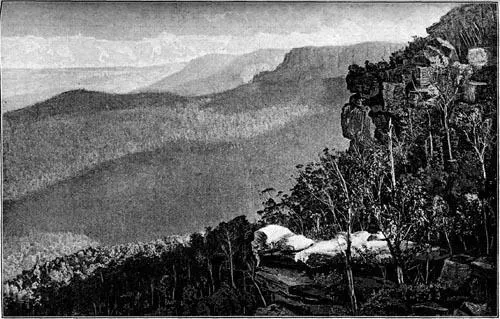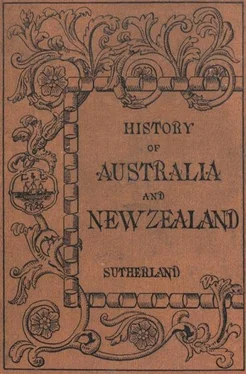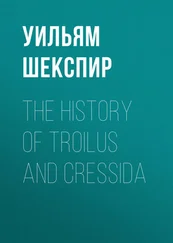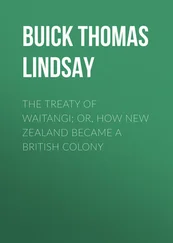
Blue Mountain Scenery, Wentworth Falls, New South Wales.
3. Governor Brisbane.—In 1821 Governor Macquarie left for England, much regretted by the colonists. The only serious mistake of his policy had been that he had quietly discouraged the introduction of free settlers, “because,” as he said, “the colony is intended for convicts, and free settlers have no business here”. His successor—Sir Thomas Brisbane—and, afterwards, Sir Ralph Darling—adopted a more liberal policy, and offered every inducement to free immigrants to make their homes in the colony. It was never found possible, however, to obtain many of that class which has been so successful in America, consisting of men who, having with difficulty gathered sufficient money for their passages, landed in their adopted country without means and with no resources beyond the cheerful labour of themselves and of their families, yet settled down in the deep, untrodden forests, and there made for themselves happy and prosperous homes. This was not the class of immigrants who arrived in New South Wales during the times of Brisbane and Darling. For in 1818 free passages to Australia had been abolished, and the voyage was so long and so expensive that a poor man could scarcely hope to accomplish it. Hence, those who arrived in Sydney were generally young men of good education, who brought with them a few hundred pounds, and not only were willing to labour themselves, but were able to employ the labour of others. In America, the “squatter” was a man who farmed a small piece of land. In Australia, he was one who bought a flock of sheep and carried them out to the pasture lands, where, as they increased from year to year, he grew rich with the annual produce of their wool. Sir Thomas Brisbane was pleased with the advent of men of this class: he gave them grants of land and assigned to them as many convicts as they were able to employ. Very speedily the fine lands of the colony were covered with flocks and herds; and the applications for convicts became so numerous that, at one time, two thousand more were demanded than could be supplied. Hence began an important change in the colony. The costly Government farms were, one after another, broken up, and the convicts assigned to the squatters. Then the unremunerative public works were abandoned; for many of these had been begun only for the purpose of occupying the prisoners. All this tended for good; as the convicts, when thus scattered, were much more manageable, and much more likely to reform, than when gathered in large and corrupting crowds. In Macquarie’s time, not one convict in ten could be usefully employed; seven or eight years after, there was not a convict in the colony whose services would not be eagerly sought for at a good price by the squatters.
This important change took place under Governors Brisbane and Darling, and was in a great measure due to those Governors; yet, strange to say, neither of them was ever popular. Brisbane, who entered upon office in 1821, was a fine old soldier, a thorough gentleman, honourable and upright in all his ways. Yet it could not be doubted that he was out of his proper sphere when conducting the affairs of a young colony, and in 1825 the British Government found it necessary to recall him.
4. Governor Darling.—He was succeeded by Sir Ralph Darling, who was also a soldier, but was, at the same time, a man well adapted for business. Yet he, too, failed to give satisfaction. He was precise and methodical, and his habits were painfully careful, exhibiting that sort of diligence which takes infinite trouble and anxiety over details, to the neglect of larger and more important matters. His administration lasted six years, from 1825 to 1831. During this period an association was formed in England, consisting of merchants and members of Parliament, who subscribed a capital of one million pounds, and received from Government a grant of one million acres in New South Wales. They called themselves the Australian Agricultural Company, and proposed to improve and cultivate the waste lands of Australia, to import sheep and cattle for squatting purposes, to open up mines for coal and metals, and, in general, to avail themselves of the vast resources of the colony. Sir Edward Parry, the famous Polar navigator, was sent out as manager. The servants and employés of the association formed quite a flourishing colony on the Liverpool Plains, at the head of the Darling River; and though, at first, it caused some confusion in the financial state of New South Wales, yet, in the end, it proved of great benefit to the whole colony.
5. The Legislative Council.—In 1824 a small Executive Council had been formed to consult with Governor Brisbane on colonial matters. In 1829 this was enlarged and became the Legislative Council, consisting of fifteen members, who had power to make laws for the colony. But as their proceedings were strictly secret, and could be completely reversed by the Governor whenever he chose, they formed but a very imperfect substitute for a truly legislative body. Yet this Council was of some service to the colony: one of its first acts was to introduce the English jury system, in place of arbitrary trials by Government officials.
6. The Newspaper War.—Governor Darling was never popular. During the greater part of his period of office intrigues were continually on foot to obtain his recall; and from this state of feeling there arose what has been called the newspaper war, which lasted for four years with great violence. The first Australian newspaper had been established in 1803 by a convict named Howe. It was in a great measure supported by the patronage of the Government, and the Governors always exercised the right of forbidding the insertion of what they disliked. Hence this paper, the Sydney Gazette , was considered to be the Government organ, and, accordingly, its opinions of the Governors and their acts were greatly distrusted. But, during the time of Brisbane, an independent newspaper, the Australian , was established by Mr. Wentworth and Dr. Wardell. A second of the same kind soon followed, and was called the Monitor . These papers found it to their advantage, during the unpopularity of Darling, to criticise severely the acts of that Governor, who was defended by the Gazette with intemperate zeal. This altercation had lasted for some time, when, in the third year of Darling’s administration, a very small event was sufficient to set the whole colony in an uproar.
A dissipated soldier named Sudds persuaded his companion, Thompson, that their prospects were not hopeful so long as they remained soldiers; but that, if they became convicts, they had a fair chance of growing rich and prosperous. Accordingly, they entered a shop and stole a piece of cloth. They were tried, convicted, and sentenced to be transported to Tasmania for seven years. This was what they wished; but Governor Darling, having heard of the scheme they were so successfully carrying out, took it upon himself to alter the course of the law, and directed them to be chained together with heavy spiked collars of iron about their necks, and to be set to labour on the roads. Sudds was suffering from liver disease; he sank beneath the severity of his punishment, and in a few days he died—while Thompson, about the same time, became insane. This was an excellent opportunity for the opposition papers, which immediately attacked the Governor for what they called his illegal interference and his brutality. The Gazette filled its columns with the most fulsome flattery in his defence, and Darling himself was so imprudent as to mingle in the dispute, and to do what he could to annoy the editors of the two hostile papers. Very soon the whole colony was divided into two great classes—the one needlessly extolling the Governor, the other denouncing him as the most cowardly and brutal of men. For four years this abusive warfare lasted, till at length the opponents of Darling won the day; and in 1831 he was recalled by the English Government.
Читать дальше













